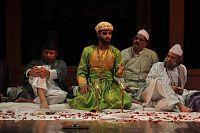The Mushaira, which forms the basis of this heart-warming play, was the last of its kind in the Mughal Court. The court had a tradition of hosting an annual Mushaira at the Red Fort. In 1857 when the law and order failed in the city of Delhi, it was evident that the Mushaira would be cancelled. But there was one person named Maulvi Karimuddin, who went from pillar to post to organize the Mushaira.
The custom was to place a bowl with a candle or flame in front of the poet whose turn it was to recite. With it the restless ‘Sham’ ended its adventurous and romantic journey. Action gave way to inaction; life to death. Since then this ‘Sham’ has not stirred.
AAKHRI SHAMA is of historic significance too. Like the custom of the ‘Sham’, it was the last such symposium held under the direct patronage of the royal palace.
AAKHRI SHAMA is of historic significance too. Like the custom of the 'Shama', it was the last such symposium held under the direct patronage of the royal palace.
The production of AAKHRI SHAMA was first staged by IPTA in 1969 and has since been staged in every nook and corner of India. It is a play that has gained a legendary status in Indian Theatre and has an ardent fan-following.
The first half of the play is devoted to vivid description of the changes that were overtaking Delhi at break-neck speed - the old Delhi, which was gay, lively and colourful even in its decadence. The city of Delhi is seen lying in ruins after the holocaust of 1857. Visibly moved by the pathetic sight, Ghalib tells in his own words his sad impressions of the unimaginable devastation and destruction that had taken place.
The indefatigable Maulvi Karimuddin , in whose fertile brain the idea of organising a mushaira originates. He visits place after place, meeting poets, talking with them, arguing with them. In fact, he makes frantic calls not only on celebrities but also on those who were not well-known. He goes to the royal palace to obtain King Bahadur Shah Zafar's approval. Maulvi Karimuddin's zeal, his enthusiasm, his sincerity and his devotion ultimately bear fruit and they all agree to participate in the Mushaira. The last Mughal emperor Bahadur Shah Zafar, whom circumstances over which he had no control, prevented him from appearing in person, deputes his son, prince Fatuh-ul-Mulk and Mirza Fakhruddin 'Ramz' to preside over it. Not only that, he also sends a ghazal to be recited at the Mushaira. This shows how much importance King Bahadur Shah attached to this Mushaira.
The second half is a factual record of the Mushaira itself. The great Masters, Ghalib, Momin, Zauq, Daag and others are seen in all their dignity and glory. Their literary encoutners, digs and jibes, bouquets and brickbats, sincere appreciation and malicious comments, all lend colour and charm to the function.
About the Group:
IPTA Mumbai has been an active part of the theatre movement in the country for over six decades having staged over 100 plays in different languages.
Current productions include Ek Baar Phir, Kaifi Aur Main, Girija Ke Sapne, Kashmakash, Biwi O Biwi, Tajmahal Ka Tender, Hum Deewaane Hum Parwaane and Shatranj Ke Mohre, Aaall izz well with Shuturmugh, Kabuliwala, and Kabuliwala Laut Aaya.
Cast and Creative team for AAKHRI SHAMA at Prithvi Theatre
Ramesh Talwar
Rakesh Bedi
Aasif Sheikh
Aanjjan Srivastav
Javed Khan
Masood Akhtar
Ram Swaroop Mago & Others



